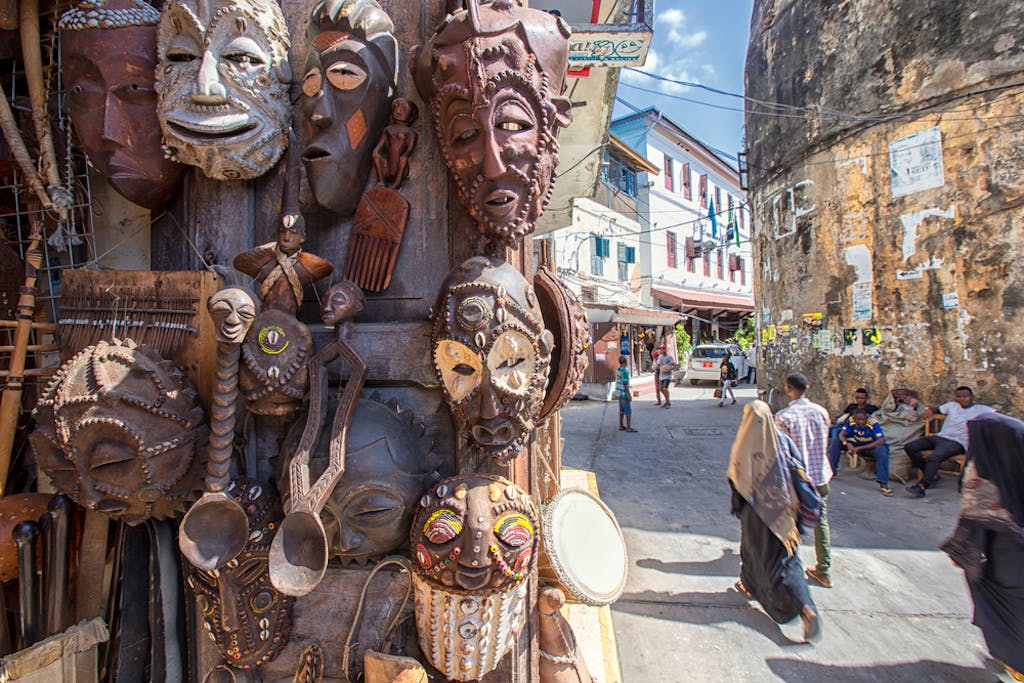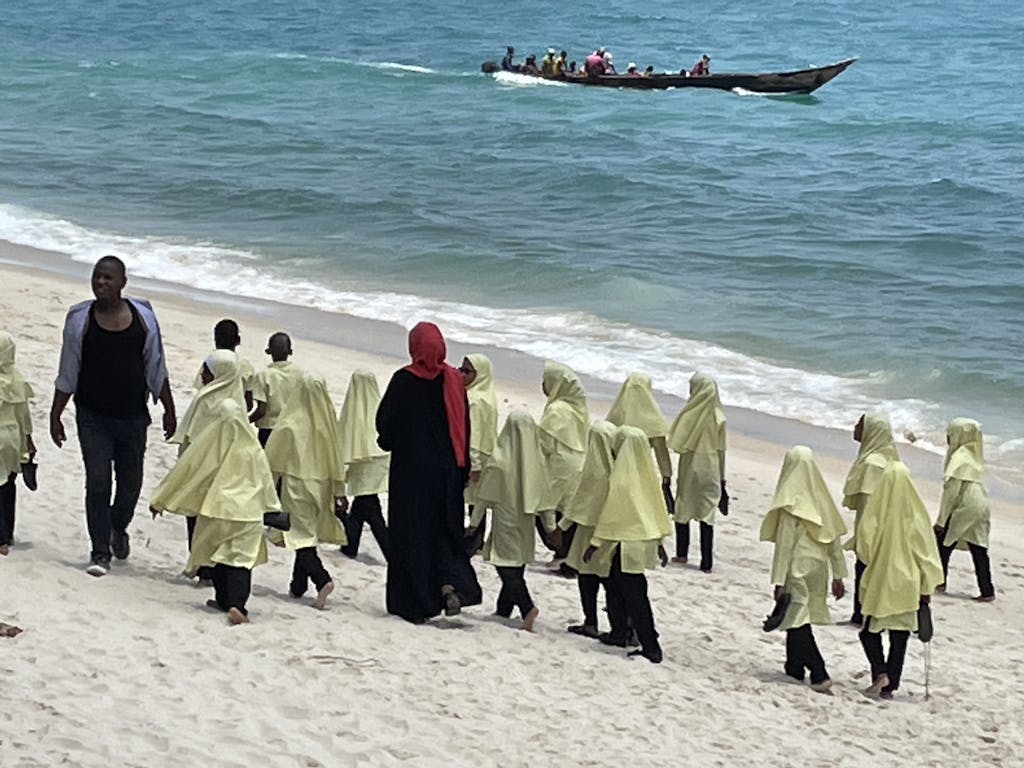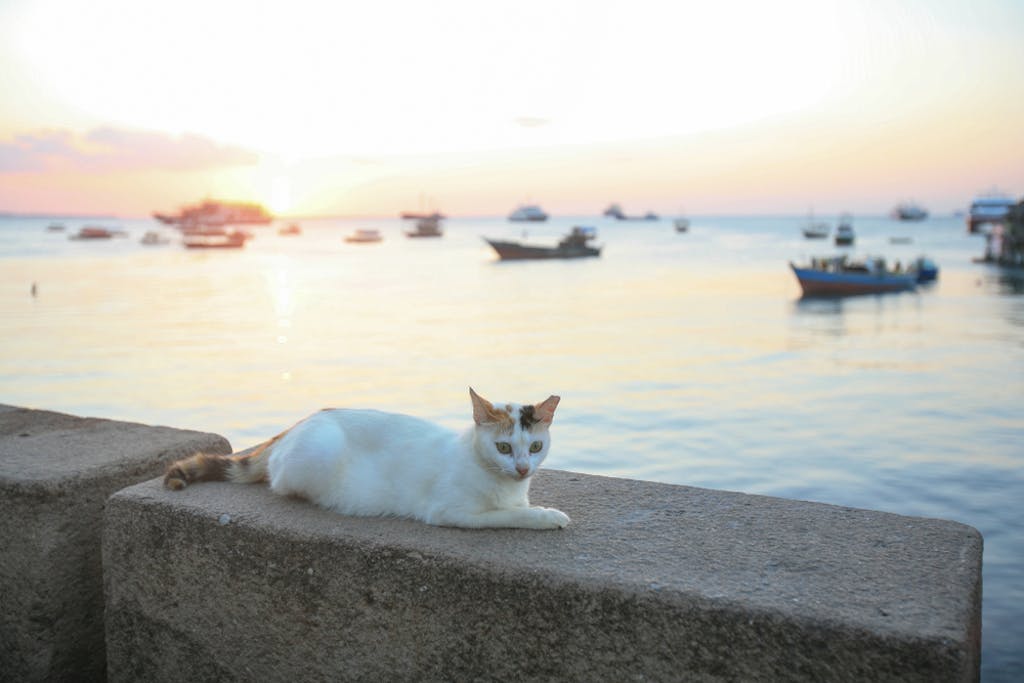Pico Iyer on Counting the Cats in Zanzibar
“It is not worth the while to go round the world to count the cats in Zanzibar.” I read those words from the stirring conclusion to Henry David Thoreau’s Walden just as I was beginning my life as a writer, and I couldn’t help but nod. My job, from now on, would be to transcribe possibilities at my desk richer than any numerical accounting. There’s beauty and wonder down every road—the pandemic reminded some of us—if only you have eyes to see it. And these days, in any case, you can visit every last corner of Zanzibar—even count its cats—online, with a vividness that might be hard to match in life.
Yet what joy it remains to find myself, one sun-blasted morning, wandering the narrow alleyways of Zanzibar’s central Stone Town. Over there is a rooftop café where visitors are sipping on skishas while looking out at dhows, sails bent almost horizontal as they bounce along the blue-green waters; over here is the solid white three-story building in which Farrokh Bulsara was born, only to return from boarding-school in his parents’ India as Freddie Mercury, future rock-star. The air smells of lemongrass, then of fish, and in the jam-packed market I’m encircled by green bananas and yellow lychees, with fire-engine red chilis all around. The faces that emerge from behind heavy, knobbed Gujarati doors could come from Persia or India or Oman or East Africa—or most likely, all of the above—as they look out into the day to see what deals might be possible.

Only 16,000 people live in the compact area tucked into the heart of Zanzibar’s capital, barely one in fifteen of the crowded city’s inhabitants; yet all the millennia of trade that have made the island twenty-two miles off the coast of East Africa a place of fable still move and breathe here. Around the intimate maze of whitewashed lanes, latticed balconies seem to touch above me, and I see herbs that will make a stranger lose her heart to me. I step into the Emerson Spice Hotel and find myself in a tiled courtyard worthy of Morocco; at the Africa House Hotel, there’s stained-glass above the red wooden staircase, and old photos to rhyme with the images from the 1920s on display in the Capital Art Studio nearby.
Around the intimate maze of whitewashed lanes, latticed balconies seem to touch above me, and I see herbs that will make a stranger lose her heart to me.
Out at sea, seasoned mariners are riding the waves like rodeo champions as the waves send their small boats rocking from side to side, the winds so strong they knock the heavy glass on my seaside table over. Just below, on the beach, a flock of saffron-scarved schoolgirls, seven or eight years old, trails past, guided by a regal young teacher in jet-black cloak and scarlet turban. The House of Wonders along the waterfront may be under reconstruction now, but inside the Old Fort you can see the grassy expanse where movies are projected every July in the Festival of the Dhow Countries. Everywhere are words—“amber” and “musk” and “myrrh”—that seem to belong to a long ago world.

As I wander the maze-y backstreets in the sweltering morning, I keep glimpsing cats darting between stalls, on the lookout for crumbs, scrawny but fearless. A sign at the Old Fort asks for blankets and food to support them; elsewhere, a flyer offers kittens and puppies for anyone to adopt. I think of the home-made zoo I passed at the northern tip of the island, near Nungwi village, in whose doorway I could see nothing but six kittens playing in the shade.
I’ve found sugar-soft beaches elsewhere in the Indian Ocean—in Mauritius—and I’ll see turquoise waters as clear and warm a few days from now in the Seychelles. But neither of those islands has the textured density of Zanzibar, the place that sounded like the end of the earth (the winning word in any casual game of Scrabble) when I was growing up. Weeks before boarding the Silver Whisper for its 2022 World Cruise, I’d come upon The Final Case, a searching new novel by David Guterson about East Africa and North America. Near his end, a selfless lawyer in his eighties cites to his son the classic wisdom, “On your deathbed you’re not going to wish you’d worked more, you’re going to wish you’d gone to Zanzibar to watch the sunset.”

My deathbed isn’t close, I hope, but it’s true about those sunsets: an Englishman on board the Silver Whisper, after traveling the Indian Ocean for thirty-five years, tells me he’ll never forget the colors in the sky he saw on his first trip to Zanzibar, twenty-two years before. I don’t even try to count the cats I saw on a single morning in Stone Town. But I’m tempted to call out to Thoreau, “Henry! It is worth going round the world–to have your sense of possibility expanded. Zanzibar has wonders Massachusetts could hardly guess at!”
British born novelist and essayist Pico Iyer traveled on Silversea’s 2022 World Cruise, aboard Silver Whisper, on the Cape Town to Mahe segment where he visited Zanzibar. Here, he shares his take on Stonetown’s cats and sunsets, both glorious, with Discover.
Pico Iyer is the author of 16 books, translated into 23 languages, on subjects ranging from Revolutionary Cuba to mystical Islam, globalism to the Dalai Lama. For over 30 years he has been a regular contributor to The New York Times, the Los Angeles Times, Harper’s Magazine and more than 250 other periodicals. A lecturer aboard Silversea’s World Cruise in 2019 and 2022, his latest book, The Half Known Life in Search of Paradise, was published in January 2023.
